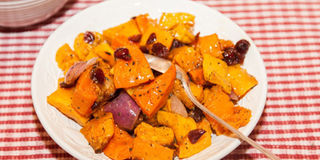Wheat is not suitable for children under 15 months

PHOTO | FILE Freshly baked sweet potatoes.
What you need to know:
- For weaning, mothers usually start with easily digestible foods like root vegetables, fruit, and rice.
- Children under 15 months should not be given wheat.
Last month, I wrote an article about Baby Boy Mukherjee’s foray into the world of solid foods. I mentioned that since he did not meet all the developmental milestones at the six-month mark, we waited a little before we started on the usual foods given to babies.
The idea was to delay the most allergenic foods until his digestive tract is more mature.
In the article, I mentioned that wheat should not be introduced until 15 months, but concerned parents wrote to me saying their children were having it at six months. Reason? It was an ingredient in the pre-packaged food they buy for their children. Since the food products in question are sold by an international company, they felt that adequate research must have been done, with food safety and allergens in mind.
So, if it is on the shelf, it cannot be a big deal, right? Wrong. Children under 15 months should not be given wheat.
Why? Prior to weaning at six months, babies’ sensitive digestive tracts are still porous and large molecules of protein can pass through before being fully digested. This can trigger an immune response and cause an allergy to develop.
For weaning, mothers usually start with easily digestible foods like root vegetables, fruit, and rice.
There are a number of foods that should not be introduced until much later, and wheat is one of these. The reason parents should wait is to avoid an immune reaction.
Symptoms that your child is reacting to a particular food are diverse. They include asthma, eczema, diarrhoea, constipation, colic, catarrh, frequent infections, mood swings, skin rashes, headaches, hyperactivity, mouth ulcers, glue ear, and a runny nose. It is important to introduce new foods one at a time to make it easy to identify any problem foods.
Also, there are plenty of other grains to choose from: Millet, buckwheat, rye, and even maize/corn. Your children have the rest of their lives to eat breads, pastas, and biscuits.
When to introduce different foods:
Six months: butternut squash, sweet potato, carrots, courgettes, avocado, brown rice, broccoli, green beans, peas, spinach, papaya, apples, pears, plums, mango, melon, millet.
Eight months: Chicken, white fish, red lentils, mushrooms, buckwheat.
10 months: Oily fish (mackerel, salmon, sardines), lean red meat, black-eye beans, brown lentils, pinto beans, chickpeas, prunes, dried apricots, coconut.
12 months: Rye, corn, barley, bananas, potatoes, peppers, cucumber, cauliflower, Brussels sprouts, berries, grapes, lychees, figs, dates, yoghurt, oats.
15 months: Wheat, citrus fruits, cooked eggs, peanut butter, ground nuts and seeds (ground to prevent choking), cheese, butter, tomatoes.
The writer is a clinical nutritionist and certified by the Nutritional Therapy Council in the UK. Please direct any questions about family nutrition to her on [email protected]




